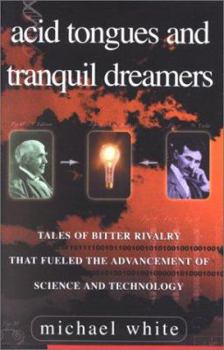Acid Tongues and Tranquil Dreamers: Tales of Bitter Rivalry That Fueled the Advancement of Science and Technology
Select Format
Select Condition 
Book Overview
As George Bernard Shaw said, The reasonable man adapts himself to the world; the unreasonable one persists in trying to adapt the world to himself. Therefore all progress depends on the unreasonable... This description may be from another edition of this product.
Format:Hardcover
Language:English
ISBN:0380977540
ISBN13:9780380977543
Release Date:February 2001
Publisher:William Morrow & Company
Length:430 Pages
Weight:1.45 lbs.
Dimensions:1.4" x 6.5" x 9.5"
Customer Reviews
3 ratings
Exciting way to present basic scientific history...
Published by Thriftbooks.com User , 15 years ago
This was a great book on scientific history. It may be a little hard for completely non-technical people to follow. However, the "scientific rivalries" theory is more of an organizing principal than a well-developed theory. That's okay. The matching of rivals keeps it interesting and memorable.
Your ringside seat
Published by Thriftbooks.com User , 21 years ago
White promotes an eight-round match of leading contenders to explain one of the ways science and technology produce champions. Each match in this series explains how rivalries among scientists developed and what long-term effects the conflicts had for science and for the rest of us. Some of these issues remain almost solely personality clashes, such as the priority question over calculus between Newton and Leibnitz. Others, the choice of AC over DC for electrical power distribution and which nation would be the first to build a nuclear bomb, are meaningful to us all. Offering brief descriptions of the issues and personalities, each of the essays is a good synopsis of the science. The personality sketches are given with a strong emphasis on the contender's childhood where it can be derived. Although the relevance of the childhood foundations seems contrived in most cases, the information provides a "human" background of people who often seem remote from us.The topics and personalities are so disparate that a general assessment is difficult, if not impossible for this work. To his credit, White has focussed on fundamental questions and not been distracted by side issues. He is at pains to be "fair", avoiding judgmental approaches and emphasising long-term impact of the conflict's resolution. If the personality involved is too obtuse, stubborn or devious to withstand White's scrutiny, he makes it clear that the problem lies with that individual. However, as he admits, he's not the only one doing the judging. Aristotle's views of nature inexplicably dominated Western European thinking for two millennia because his proposed "four basic elements" could be merged with nearly any philosophy. Only reason backed by empirical evidence would overcome this long tradition. The variety of topics forces some selectivity in evaluating White's effort, but one essay may be exemplary. In describing the Monkeys and Men debate as a clash between Charles Darwin and Robert Owen, White stumbles badly. There was little "rivalry" in this so-called debate, since Owen simply flatly refused to accept species "transmutation". Since this concept was held by many educated people, Owen was already out of his time. White notes Owen's strategy of remaining anonymous, but doesn't criticise it. Since that was Darwin's chief objection to Owen, this is an amazing omission. Darwin's real problem, natural selection applied to humanity, was the major stumbling block to universal acceptance to his concept. White deals with that issue only in passing, and that incorrectly [Darwin mentioned "man and his beginnings" but once in Origin, not White's "few"]. He lauds Owen as England's "leading biologist", a questionable claim at best. Yet in his description of the clashes between Owen and Huxley, he avoids their confrontation over the hippocampus in ape brains, in which Huxley demonstrated his superior research abilities in Owen's own field. In dealing with Darwin's commun
Eight good stories
Published by Thriftbooks.com User , 23 years ago
I have reviewed Acid Tongues in the Street Cred column of Wired Magazine (April 2001, p. 218); I won't repeat my whole review, since that is available in the magazine and at Wired's online site. I conclude that "Michael White delivers blow-by-blow accounts of the rivalries that underlay eight historical advancements, and he enriches each story with analysis, solid scientific explanation, and detailed biographies of each combatant." However, the whole never equals more than the sum of the parts. "White's principal assumption seems to be that rivalry fuels the advancement of science and technology." But he never proves the point. Edison's stubborn opposition to alternating current, for example, didn't really advance science so much as delay widespread recognition of the superior technology."Acid Tongues' thesis begs for a comparison of competitive and noncompetitive research, but--contrary to the book's title--we encounter no 'tranquil dreamers.'" I also have other minor quibbles, but conclude that "although Acid Tongues may not deliver an overarching argument, it does prove one thing: It's fun to read about rivalries." - Edward Samuels, author of The Illustrated Story of Copyright






